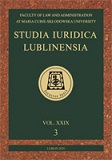Axiology of Administrative Discretion (gyōsei sairyō) as Well as Administrative Guidance (gyōsei shidō) in Japan from the Perspective of Judicial Control
Axiology of Administrative Discretion (gyōsei sairyō) as Well as Administrative Guidance (gyōsei shidō) in Japan from the Perspective of Judicial Control
Author(s): Hiroshi KanekoSubject(s): Law, Constitution, Jurisprudence, Energy and Environmental Studies, Ethics / Practical Philosophy, Court case, Comparative Law, Administrative Law
Published by: Wydawnictwo Naukowe Uniwersytetu Marii Curie-Sklodowskiej
Keywords: axiology;administrative discretion;administrative guidance;administrative law;administrative litigation;Japanese law;German law;Tatsukichi Minobe;Minamata disease;lawsuits against nuclear power plant;
Summary/Abstract: In Japan, the Court often examines the technical aspects of administrative discretion if there was a proper decision-making process. Such control could rely too much upon each judges’ viewpoint, which elements in the whole process of administrative discretion have critical gravity to evaluate (kōryo kachi). The pre-war legal scholars suggested the best way to increase judicial protection on the citizens’ rights endangered by administrative discretion. The need to establish robust legal theory based on it the Court guarantees the balance between smooth enactment of administrative measures and maintenance of social justice is still enormous. Administrative guidance was, for a long time, out of the scope of judicial control. This institution is Japan’s original so that its implication well exceeds the standard understanding of mere instruction in other legal cultures. The Japanese Court acknowledges the existence of “forced consent” behind it more frequently in recent years.
Journal: Studia Iuridica Lublinensia
- Issue Year: 29/2020
- Issue No: 3
- Page Range: 135-148
- Page Count: 14
- Language: English

